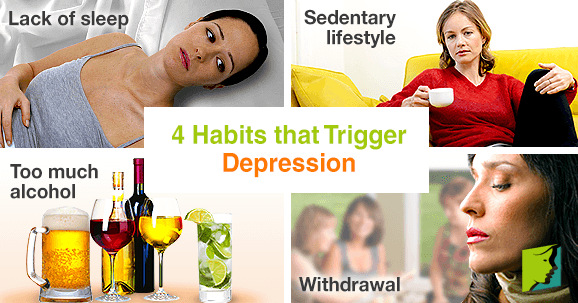Depression can have negative consequences on a person's life, and it is not always clear what causes the condition. There are many different factors that can bring on depression, including hormonal, genetic, and lifestyle factors. Keep reading to learn more about habits you might have that are triggering depression.
What Is Depression?
Depression is defined as a chronic feeling of sadness, often leaving the sufferer with a sense of hopelessness. It is a clinical condition that differs from the temporary sadness that is felt after an unhappy or distressing event. Depression can make day-to-day life very difficult, and carrying out simple tasks can leave the person feeling exhausted. Symptoms of depression can include fatigue, feelings of worthlessness, and concentration problems.
Habits That Trigger Depression
Many people find that by looking at their lifestyle habits, they can identify some features that trigger or worsen feelings of depression. The list below outlines some of the things that could be activating depression in some individuals.
Lack of sleep
Lack of sleep can raise the levels of cortisol in the body. Cortisol is mostly associated with stress, so too much of it can lead to irritability and irrational thoughts. Bad sleep patterns can be caused by drinking caffeine or alcohol before bed, sleeping in a room that is too hot or noisy, or having an irregular sleeping pattern.
Sedentary lifestyle
Physical activity encourages the release of serotonin and endorphins, neurotransmitters that naturally lift mood. Therefore, a lifestyle that lacks exercise means the person does not benefit from these mood-elevating effects. A typical adult is advised to get at least 30 minutes of exercise every day.
Too much alcohol
Alcohol is a depressant, so too much of the drug can bring on or worsen low mood. It is sometimes tempting to use drink as an escape from negative feelings, but this effect is only short-term. The long-term consequences of alcohol consumption can include depression.
Withdrawal
Although it can be tempting to withdraw from social interaction when suffering from depression, this can also worsen the illness. Humans are hard-wired to need social stimulation, so a lack of this can worsen symptoms. Too much time alone can also lead to a higher risk of obsessing over negative thoughts, which can exacerbate low mood.
Habits can be difficult to break, but breaking the aforementioned ones could really have a positive effect on your mental health. Depression is a difficult illness to live with, but making a few lifestyle changes can help keep it at bay.
Sources
- Harvard Medical School. (2008). Adopt Good Sleep Habits. Retrieved August 25, 2014, from http://healthysleep.med.harvard.edu/need-sleep/what-can-you-do/good-sleep-habits
- Harvard Medical School. (2008). Sleep and Mood. Retrieved August 25, 2014, from http://healthysleep.med.harvard.edu/need-sleep/whats-in-it-for-you/mood
- National Health Service UK. (2013). Clinical depression. Retrieved August 25, 2014, from http://www.nhs.uk/Conditions/Depression/Pages/Introduction.aspx
- National Health Service UK. (2014). Clinical depression - Causes. Retrieved August 25, 2014, from http://www.nhs.uk/Conditions/Depression/Pages/Causes.aspx
- National Health Service UK. (2014). Exercise for depression. Retrieved August 25, 2014, from http://www.nhs.uk/conditions/stress-anxiety-depression/pages/exercise-for-depression.aspx
- National Health Service UK. (2014). Tips for coping with depression. Retrieved August 25, 2014, from http://www.nhs.uk/Conditions/stress-anxiety-depression/Pages/dealing-with-depression.aspx
- University of California Los Angeles. (2013). UCLA neuroscientist's book explains why social connection is as important as food and shelter. Retrieved August 25, 2014, from http://newsroom.ucla.edu
- University of Maryland Medical Center (2013). Depression. Retrieved August 25, 2014, from http://umm.edu/health/medical/altmed/condition/depression




